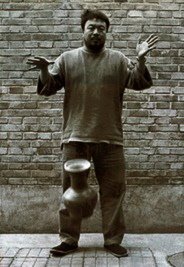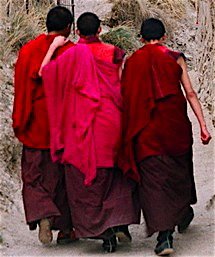I have decided to include this small exchange that I had between Pugster and Owltucan, two commentators on Mark’s China Blog, regarding foreign press coverage of China. These two had a long exchange that I ended up briefly adding to. I have included it for two reasons, the first, because I recently wrote a note here about 'Reckless and Lazy Western Journalism', and this continues on from that. Secondly, Owltucan made some good points that I would like to remember. Mark’s post was itself inspired by Timothy Garton Ash’s interesting article: ‘Lack of News about China has nothing to do with Bias’.
My first note:
I, in essence, agree with your very first comment Pugster, that Western News Agencies are too quick to give a lot of China related news a Communist Party, Authoritarian, Military twist. Although, as Mark points out, there are a plethora of stories that do not take that route, there are still too many that seemingly do so, and without justification. Owltucan offers the reasoning behind it, in his third post, where he mentions Fox News and how they offer the sensationalist and nationalistic headlines and stories that the masses desire.
My concern is that these stories actually crop up across the media spectrum and prejudice an audience, quite often without justification, that I find very dis-heartening and dangerous. OT goes on to say: ‘Interesting stories sell newspapers. To create an interesting story, you usually have to find bad, surprising news. People are not interested in hearing normal positive news. When you watch TV in China or read newspapers you will often hear/read things like "Hu Jintao visited Mexico and confirmed that China has good relations with Mexico and will work together with Mexico." You never hear this kind of things in western news because... it is not news. No one is interested in hearing about the normal workings of government.’
First, Pugster is a little too quick to make sweeping generalizations, I understand that, and OT has attempted to give him a more nuanced perspective.
However, I do not believe that the calling from the market-what the people want- is justification for the biased, mis-leading, often prejudicial media that can exist in the West. OT, I know you are not saying it is. In that sense, one mis-leading story is too many, and Pugster and others like him, or her, have every justification to get a little irate, and it is actually understandable why they sometimes go a little far in their interpretation. This mere fact that it can make people feel so violated is an indictment of our own media and more importantly society, and in my opinion is very worrying. Particularly so, with regard to China’s growing role in the world and many of our own nations growing weakness, and the consequential interpretation of these news stories in the minds of the masses. (I am fully aware that terms such as the West, Western or the masses have no subtlety as terms but they will do for now)
Secondly, with regard to OT’s view that good news is not news, again what a terribly sad indictment of our societies, if only negative, sensational, critical issues are news. I was chatting with a friend here in China recently and we were discussing how much we both enjoyed the simplicity, the innocence and the heartfelt honesty, whether of word or emotion, of many Chinese people. I absolutely disagree that good news is not news, it is just not true, even if it is in Britain or America, and even if news media outlets do of course need to keep tabs on the government. As you also added OT: ‘it is important for us to all realize that we know less than we think we know. Only then can we work hard to understand other people and their points of view.’
I think we, the Western we, have got to go a lot further in realizing we know less than we think we know. As our societies fragment ever further, with less and less funding going to places that desperately need it and with other countries around the world becoming more and more competitive, I believe our media and our governments need to think a little bit more carefully and thoughtfully about how they regulate each other, and thus our societies, and our societies views of themselves and of the ‘other’.
Owltucan’s response:
NFXA, you are right - UNFAIR negative news coverage of China IS an indictment of our society. Therefore we have to carefully analyse what we think of our system - is it a good system? Why do these things happen? Is there some simple way we can solve this problem? I would argue that while the 'Western' system is by no means perfect, it is the best system that has been found so far.
If we want a free press and all the enormous benefits that go with it, we have to accept that there will sometimes be problems such as unfair reporting. We can work to change this through advocacy campaigns, organisations which work for greater understanding between countries, media monitoring organisations, etc., but to advocate for greater government control of the media is VERY dangerous. Furthermore, it isn't clear how further government regulation of the media would lead to an improvement in the situation. How do you know that the government wants to paint a positive view of China? It is often in a government's interest to direct its citizens' anger away from itself and towards other countries. Indeed, contrary to what Pugster has said, Chinese media regularly paints a biased and unfair picture of other countries. We see thousands of stories detailing the negative aspects of democracy for example, but rarely do we see an example of how it has solved a problem - so much for Chinese media only reporting good news.
To address NFXA's next point, I also agree that good news is news. However, what I'm saying is that a very useful role of the media is to uncover surprising, 'new' things, not to just give a running commentary on the mundane workings of government (such as my Mexican leaders example). I would argue that surprising/new positive news is reported in the western media, although I would say that the most USEFUL role of a free press is to monitor government and uncover the negative things which people in government try to do. I also fully agree that we need to change the ways we consider our own societies and other societies, but it's easy to say this. Of course this is important and a positive thing. But how do you actually propose we do this? To say government needs to provide more regulation is a bit of a hazy solution. If you're saying government needs to actively control what gets reported in the media then I don't think I can agree with you, for the reasons set out above. If that's not what you're saying, then what are you suggesting?
My final comment:
Owltucan, I am no expert on the western media and its regulatory bodies, though I do not accept that mis-representative reporting should be a natural by-product of a free press. But anyway, that is a point for those with greater knowledge and insight into the regulatory bodies involved, or not. I make no excuse for a lack of any detailed answers, I have none, as I believe these issues run so deep into the fabric and nature of our society, that has, as you noted, existed for all these centuries, as well as in the psychology of the western or even human mind.
What I do find intriguing though is your continual return to the role of the media, not as a source of current affairs in all its forms but as the regulator of government. This seems a greater indictment of our societies and in this case our government, our democracy, than anything else. That the media, so outlined above by Garton-Ash, as acting so blatantly on the basis of market principles and appeals to the lowest common denominator, should be our great saviour in terms of holding the government to account. That would be quite amusing if it was not so sad. I have no answers OT but I came to China to get a sense of what is going on here, it is increasingly throwing a bright light back on my own country and its system.
The media maybe, and I say maybe, would be better to not think of itself as simply the regulator of government but as a key factor in the nature of our society. I don’t just mean one with a free press, but one with horrible atrocities that go on between people, one that has epidemic levels of ill-discipline in classrooms, a culture of shallow superstardom as motivation for a generation and a health service whose range and depth is being reduced by the week. Our media, our government, our economic system, our values are all in play here, but they are not working too well. What is the answer? I do not know. A government and a system we believe in would be a good start, and then it could do the job of governing. One of my professors at University once wrote:
“In my opinion, there is actually a profound tension, even contradiction between democracy (based on the postulate of equal power) and capitalism (which inevitably generates unequal wealth, and therefore also unequal power)...the modern Western polity, contrary to Fukuyama, actually contains a profound internal contradiction.”
Nietzsche once wrote:
“Democracy wants to create and guarantee as much independence as possible: independence of opinion, of mode of life and of employment... the three great enemies of independence... are the indignant [poor], the rich and the parties- I am speaking of democracy as something yet to come”.
Sorry to be a bit general Owltucan, but I do not have the answers. It was good to read your points of view; it has made me think the last couple of days.
Monday, 27 April 2009
An Impression of the West from an Image of the East
Subscribe to:
Post Comments (Atom)












No comments:
Post a Comment